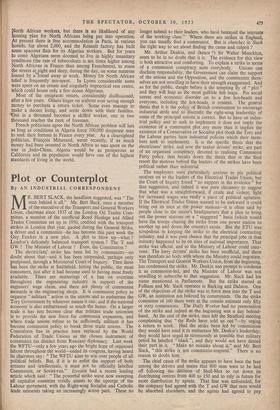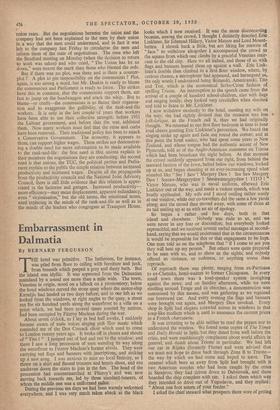Plot or Counterplot
By AN INDUSTRIAL CORRESPONDENT R. BERT SLACK, the headlines suggested, was " The man behind it all." Mr. Bert Slack, once a member of the executive of the Transport and General Workers Union, chairman since 1937 of the London Oil Trades Com- mittee, a member of the unofficial Road Haulage and Allied Trades Committee set up in 1950, credited with the transport Strikes in London that year, gaoled during the General Strike, a driver and a communist—he has become this past week the Guy Fawkes in a new plot. A plot to blow up—what ? London's delicately balanced transport system ? The T and GW ? The Minister of Labour ? Even, the Constitution ? The electricians' strike has been led by communists—no doubt about that—and it has been suspended, perhaps only postponed, through a Ministerial Court of Inquiry. Then there has been the strike at Smithfield, hitting the public, the meat Consumers, just after it had become used to having meat freely available. There are mutterings of a ban on overtime throughout the engineering industry in support of the engineers' wage claim, and there are plenty of communist i stewards in the engineering shops. It is communist policy to organise " militant " action in the unions and to embarrass the Tory Government by whatever means it can; and if the national economy is also embarrassed so much the better. On a larger scale it has just become .clear that militant trade unionism is to provide the new force for communist expansion, and where trade unions refuse to be sufficiently militant it has become communist policy to break those trade unions. The Cominform has in practice been ' replaced by the World Federation of Trade Unions as the chosen instrument of communist (as distinct from Russian) diplomacy. Last week the WFTU—only a few years ago the bright hope of organised labour throughout the world—ended its congress, having heard its chairman say: " The WFTU aims to win over people of all political beliefs. But, if it is to enlist the support of both artisans and intellectuals, it must not be officially labelled Communist, or Soviet-run." lzvestia had a recent leading article which said: " The powerful strike wave now sweeping all capitalist countries vividly attests to the upsurge of the Labour movement, with the Right-wing Socialist and Catholic trade unionists taking an increasingly active part. These no longer submit to their leaders, who haie betrayed the interests of the working class." Where there are strikes in England, you can usually find a communist. But is cherchez le Slack the right way to set about finding the cause and culprit ?
Mr. Arthur Deakin, and (hence ?) Sir Walter Monckton, seem to be in no doubt that it is. The evidence for this view is both attractive and comforting. To explain a strike in terms of a communist conspiracy suits everybody. Unions can disclaim responsibility, the Government can claim the support of the unions and the Opposition, and the communists them- selves are not unwilling to have their strength exaggerated. And as for the public, dangle before it the tempting fly of " plot " and they will leap as the most gullible fish leaps. Pin social unrest and economic disorder on to a few hot-heads and everyone, including the hot-heads, is content. The general thesis that it is the policy of British communism to encourage industrial strife and to discredit the right-wing leadership of some of the principal unions is correct. But to have an indus- trial policy and to seek to implement it does not imply the existence of a communist plot any more than it implies the existence of a Conservative or Socialist plot (both the Tory and the Labour parties have industrial policies which their mem- bers seek to implement). It is the specific thesis that the electricians' strike, and now the' tanker drivers' strike, are part of an organised conspiracy, devoted to realising Communist Party policy, that breaks down the thesis that in the final resort the motives behind the leaders of the strikes have been political rather than industrial. • The employers were particularly anxious to pin political motives on to the leaders of the Electrical Trades Union, but the Court of Inquiry found " no support in the evidence" for that suggestion, and indeed it was pure chicanery to suggest that what, was a straightforward, if crude and violent, fight for increased wages was really a piece of political agitation. If the Electrical Trades Union wanted to be awkward it could bring out its men at the power stations—it is often said by people close to the union's headquarters that a plan to bring out the power stations on a " staggered " basis (which would have the troops chasing the strike from one power station to another up and down the country) exists. But the ETU was scrupulous in keeping the strike to the electrical contracting industry, and it was pure chance that the principal jobs in that industry happened to be on sites of national importance. That strike was official, and so the Ministry of Labour could inter- vene. The lorry drivers' strike has been unofficial, and there was therefore no body with whom the Ministry could negotiate. The Transport and General Workers Union, from the beginning, has condemned the strike. Mr. Deakin was prompt to condemn it as communist-led, and the Minister of Labour was not unwilling to subscribe to that suggestion. Mr. Slack had his name mentioned in Parliament. But the strike started at Fulham and Mr. Slack operates in Barking and Dalston. One of the objectives of the strike was to force men into the T and GW, an institution not beloved by communists. On the strike committee of 160 there were at the outside estimate only fifty or sixty communists. The Daily Worker had no premonition of the strike and indeed at the beginning was a day behind- hand. At the end of the strike, men left the Stratford meeting complaining that " the Reds have sold us out "—by urging a return to work. Had the strike been led by communists they would have used it to embarrass Mr. Deakin's leadership; they would have urged as strenuously as possible that military petrol be labelled black "; and they would not have denied their part in it. "Make no mistake about it," said Mr. Bert Slack, " this strike is not communist-inspired." There is no reason to doubt him.
The chief cause of the strike appears to have been the fear among the drivers and mates that 800 men were to be laid off following the decision of Shell-Mex to cut down its distributing centres from 400 to 150 and to rely in future for more distribution by agents. That fear was unfounded, for the company had agreed with the T and GW that men would be absorbed elsewhere, and the agents had agreed to pay union rates. But the negotiations between the union and the company had not been explained to the men by their union in a way that the men could understand, and in fact it was left to the company last Friday to circularise the men and inform them of the state of negotiations. The men who left the Stratford meeting on Monday (when the decision to return to work was taken) and who cried, " The Union has let us down," were nearer the mark than those who blamed the reds.
But if there was no plot, was there and is there a counter- plot ? A plot to pin responsibility on the communists ? Plot, again, is too strong a word, but Mr. Deakin is ready to blame the communists and Parliament is ready to listen. The strikes have this in common, that the communists support them, are fast to jump on the bandwaggon and crack the whip. But to blame—or credit—the communists is to flatter their organisa- tion and to exaggerate the gullibility of the rank-and-file workers. It is only in the last couple of years that workers have been able to use their collective strength; before 1951 the Labour government, and before that the war, inhibited them. Now many workers must feel that the reins and curbs have been removed. Their traditional policy has been to attack a Conservative Government. The economy, it appears to them, can support higher wages. These strikes are demonstrat- ing a double need for more information to be made available to the rank-and-file: the first need is that unions explain to their members the negotiations they are conducting; the second need is that unions, the TUC, the political parties and Parlia- ment explain to the public the simple relation between increased produbtivity and increased wages. Despite all the propaganda from the productivity councils and the National Joint Advisory Council, there is still little evidence that this relation is appre- ciated in the factories and garages. Increased productivity— more efficiency—may mean displacement, apparent redundancy, even " victimisation," but the old terms, the emotional terms, need 'replacing in the minds of the rank-and-file as well as in the minds of the leaders who congregate at Transport House.



































 Previous page
Previous page